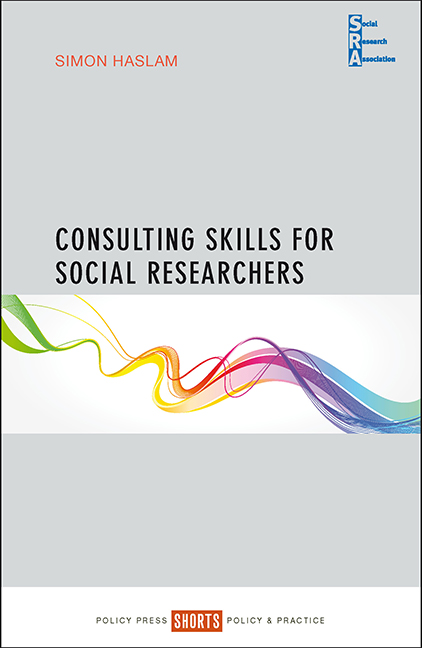2 - Key ingredients of consulting
Published online by Cambridge University Press: 05 April 2022
Summary
This chapter seeks to outline consulting and begin to make the links with social research. It contains five sections:
• Section 1 looks at the main components of consulting activity, drawing attention to underpinning concepts.
• Section 2 explores how consulting can accomplish its main role, which is to be valuable to the client.
• Section 3 introduces the three main paradigms that encompass consulting activity – they are all useful, and capable of being valuable to a client, but do so in different ways.
• Section 4 emphasises the importance of trust-based relationships in consulting, and outlines the salient ingredients.
• Section 5 looks at the role of ethics in practice (which will be familiar ground for many social researchers) and moves towards greater ‘professionalisation’ of consulting activity.
Components of consulting
Defining consulting?
There are many explanations of the term ‘consulting’ which seek to explain what consulting is about. They typically share four ingredients:
• It's about independence
The first is about the consultant's independence from the context. This means standing outside of the organisation or group being consulted, with the dual characteristic of objectivity and detachment. It is from this detached position that most consulting work is able to add to the client's own perspective and help realise insight that might otherwise be unidentified. For someone external to the client organisation, the concept of independence is straightforward. It is less clear for those with ‘internal’ consulting roles or positions.
• It's about ‘advice’
The second factor is around advice, which is probably the common currency of all consulting work. Consulting is viewed as something in which a client's knowledge and/or capability is enhanced though the provision of advice. As we shall see, the term ‘advice’ requires a liberal interpretation, as there are several ways that advice can be both sourced and presented. Some advice is provided directly by the consultant based on his or her expertise, while other advice might arise from the consultant's facilitation of the client's view of the prevailing data, or indeed the client's own opinion.
• It's about projects
Consultants talk about ‘interventions’, implying that consultants are temporary stakeholders in any client situation. An intervention will have a start point and also a finish – consulting is not a continual activity.
- Type
- Chapter
- Information
- Consulting Skills for Social Researchers , pp. 5 - 32Publisher: Bristol University PressPrint publication year: 2017

